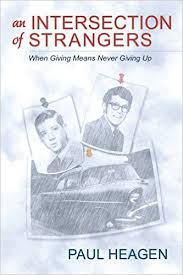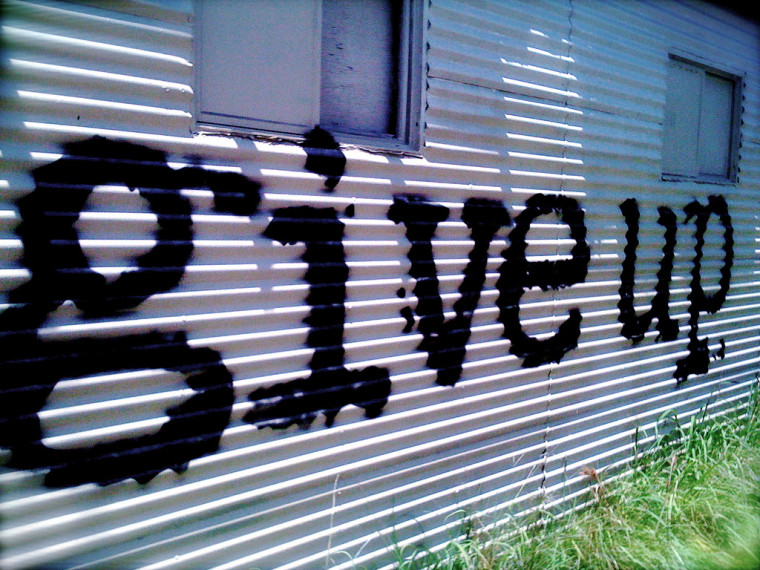
There are moments when all we can do is shake our head and state the obvious, “you can’t make this stuff up!” So it was on one late August afternoon in Northern Kentucky.
An early afternoon meeting ends, leaving me near my home and hungry. Seeking a quick lunch, I pull into my garage and as I ease out of my car, I hear it. A loud thud followed by a roaring engine and I get my first glimpse of the “you can’t make this stuff up” experience coming straight toward me as I peer through the window at the end of my garage.
A blue truck, engine thundering and tires spinning in the grass, heads toward my shocked gaze as I search for the face of the driver. Head jerking from side to side, hands writhing in contorted motions, his truck’s destination is unknown until it hits the large landscaping rocks in front of my garage, which spins the vehicle toward my driveway and the large, 8-foot poles holding hinged entrance gates. Slamming into one of the poles the wheels keep spinning, the driver’s foot unable to release the gas until one tire goes flat and settles the truck into a cornered resting place.
I hurry to the window of the truck and begin an impossible conversation with the driver. Still immersed in some kind of seizure, he jerks and moans, unable to focus on me or the cries of his 3 children in the back seat of the extended cab. A neighbor lady joins my investigation and while calming the children, she whispers, “there is a gun on the console between the front seats.”
I locate the gun and dial 911 to report the accident. Only a half block away, the police and emergency folks arrive soon, but not before one unforgettable visitor to this already strange set of circumstances.
I hear her from at least 30-40 feet away. She is making her way up the street with a hurried pace. She closes in on the object of her scorn (he had evidently clipped her car at the intersection), her cursing is loud and clear: “You blankety-blank, what the blankety-blank do you think you are doing? I am glad you got caught, you blankety-blank!”
She draws the attention of everyone as she walks up my driveway to confront the culprit of her contempt only to slam into a harsh wall of realization; she is cursing a man having a full-blown seizure. Unexpectedly her body and language do a backwards somersault. Her “god”-laced profanity in cursing the man’s existence suddenly changes to petitions of help: “Oh Lordy, Lordy, help that man! Somebody help that man! Somebody needs to help that man!”
She exits as quickly as she arrives, but my redemptive recollections of that day linger long beyond the estimates and insurance paperwork following that “you can’t make this stuff up” day.
For the record, the driver walked away, albeit slowly, from the accident. The victim of a diabetic seizure, his children were calmed, the truck towed, and yes, he had a license to carry the gun.
My deeper reflections of that day only recently surfaced. Knee-deep in Advent declarations and discoveries, I could not miss the parallel. The dictionary says a “diabetic seizure occurs when the body receives a number of different signals from the brain that happen at the same time and contradict each other.” Our world is awash with a myriad of diverse but simultaneous signals, which contradict each other and often leave us in a senseless seizure.
Yesterday, I watch the television screen at my gym offer alerts about the hostage situation in Sydney, Australia. The siege ends with the gunman and two captives dead.
Today, the alert on my phone produces a gasp as I read of the slaughter of over 100 children in the Peshawar school attack in Pakistan by Taliban militants.
And our own country is awash with the conversation around the recently released report on CIA torture.
The grand contradiction, however, comes when we boil the Christmas story down to a yearly celebration of mangers and malls. We sing with the angels about “peace” on earth, but when it is all over we leave our world peace to politicians and beauty queens. All these signals leave us numb and needy.
We are numb and needy for a clear, convincing Christmas message to awaken us from the sugary sweet seizure of a sentimental story gone stale. So, may I offer you some sanctified “smelling salts” to awaken you to the clear, convicting message of the Christ child come to earth.
To understand this story we must awaken to the place, Bethlehem. This place is on the “other side of the tracks” and it is intended to awaken us to the fact that God is doing something about real problems in the real world.
To understand this story we must awaken to the person, Jesus. This person, Jesus, breaks down walls. He breaks down walls of violence and injustice, rich and poor, worthy and worthless, and the sin and death that separate us from knowing the love, peace and justice of God in this world.
To understand this story, we must awaken to the peace, an inside out proposition available to Christ’s every follower. Peace will never simply be the absence of conflict. Real, honest, lasting peace is the presence of God through a personal relationship with Christ that exudes a hunger and thirst for right relationships, both human and divine.
To understand this story we must awaken to the personal, the personal opportunity we have to play a leading role in this real life drama of God come down in human form. Honesty, the choice is ours. We can either slip into the sugary sweet seizure of a sentimental story gone stale or we can awaken to the miracle of the Bethlehem Christ child come true.
Really, “you can’t make this stuff up!”








